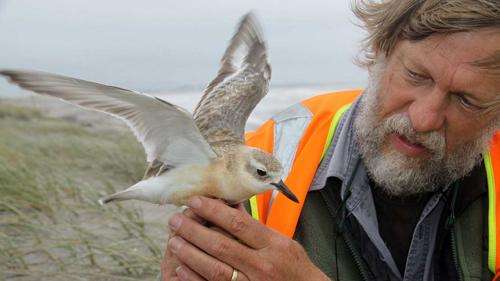Dotterels doing well post-Rena

(Phys.org) —Monitoring shows the population of rare New Zealand dotterels captured during the Rena oil spill has recovered well from the event.
About 120 dotterels were in the area between Matakana Island and Matata at the time of the spill in October 2011, and the decision was made to take 60 into captivity to keep them out of the path of the oil.
Translocation of the birds and release elsewhere would not have helped as they would have returned quickly to their breeding territories.
Had the remaining dotterels in the area been lost to oil, the "insurance" population in captivity could have been used to re-establish dotterels in the region.
Independent shorebird ecologist Dr John Dowding has been monitoring the population since it was released back to its habitat at the end of 2011. He says of the dotterels taken into captivity, more than three-quarters were alive a year later.
"There were some losses in the first month after release – probably due to the respiratory condition that killed six birds while they were captive – but after that survival has been normal," he says.
Once dotterels begin breeding, they typically remain at the same site for many years. "As it was not always possible to catch both birds in a pair, some pairings were disrupted during the pre-emptive capture."
In spite of this, most of the survivors were paired and breeding again a year after release. Dr Dowding says that overall, the dotterel population in the western Bay of Plenty appears to have survived the Rena incident reasonably well.
"One year on, numbers at most of the important sites are similar to those before the grounding," he says. "This is an encouraging result; dotterels can live for up to 30 years, and the one season of disruption needs to be viewed in that context.
"After some losses shortly after release, the birds held in captivity also appear to have re-adjusted to life in the wild, showing normal rates of survival and dispersal, and typical levels of breeding activity."
However, he says there is always the potential for longer-term effects, and monitoring will continue. "To date, the results suggest the pre-emptive capture exercise was justified; in spite of some losses, the captive population would have been sufficient to allow the regional population to re-establish, had the remaining wild population been lost to oil."
National Oiled Wildlife Response Team co-ordinator Kerri Morgan says that the mortalities were disappointing, although not entirely unexpected.
"We always knew the period in captivity would be stressful and potentially risky. However, it's encouraging to see that survival rates of released birds have now normalised and hopefully this will continue into the future."
Provided by Massey University





















